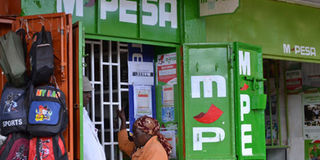Mobile cash transactions hit Sh1.7trn

An M-Pesa shop. Kenyans transacted more than Sh1.7 trillion on their mobile phones in the first 11 months of 2013, surpassing the value of the country’s budget this financial year. PHOTO/FILE.
What you need to know:
- The country’s budget this financial year is Sh1.6 trillion. One trillion is made up of one thousand billions.
- With mobile phone transactions standing at over Sh3 billion daily compared to Sh67 billion that is transacted in different platforms in the national payment system like cheques, cash and the real time gross settlement system, the opportunity to rope in the Sh67 billion to the mobile phone and the electronic formats is even bigger.
- The draft regulations on the NPS made several recommendations among which e-money providers would be required to operate platforms that are able to be accessed and operated by other payment systems in Kenya.
Kenyans transacted more than Sh1.7 trillion on their mobile phones in the first 11 months of 2013, surpassing the value of the country’s budget this financial year.
This represents a 23.7 per cent increase from Sh1.4 trillion in the same period in 2012.
And this has been attributed to increased uptake of mobile phone financial services due to convenience, ease of use and security.
The country’s budget this financial year is Sh1.6 trillion. One trillion is made up of one thousand billions.
“The convenience of mobile payments continues to appeal to the market. It is also easy to transact and the security is high,” said Mr Gichane Muraguri, director at Tangaza Pesa, a mobile money provider that expedites transactions across all mobile phone networks in Kenya.
Mobile transactions now range from transfer of money, payment of bills, school fees and even in making savings and borrowing money.
The trend is being accelerated by the continued integration of mobile money with financial institutions in the provision of services. Banks have also increasingly rolled out mobile payment or transaction platforms, such as Kenya Commercial Bank’s M-Benki, Family Bank’s PesaMob, Commercial Bank of Africa and Safaricom’s M-Shwari, among others.
CASHLESS SOCIETY
“We are happy with such growth and it definitely means Kenya is slowly moving into a cashless society. Mobile money has become a way of life for more Kenyans and there is still big room for growth,” Safaricom’s chief executive officer Bob Collymore said by phone.
“Given that a lot of transactions are still done in cash, we see a big opportunity with products such as Lipa na M-Pesa going forward. It is one of our key pillars of growth as a company,” Mr Collymore said.
With mobile phone transactions standing at over Sh3 billion daily compared to Sh67 billion that is transacted in different platforms in the national payment system like cheques, cash and the real time gross settlement system, the opportunity to rope in the Sh67 billion to the mobile phone and the electronic formats is even bigger.
DIFFERENT PLATFORMS
“We’ve hardly scratched the surface,” Mr Muraguri further said, adding that the opportunity for the market is in attracting the Sh67 billion that is transacted daily in the different platforms.
As at the end of November 2013, the number of mobile money agents stood at 112,947, a 50 per cent increase from 75,226 in the same period last year, which was also a boost to the transactions.
This is, however, despite the inability for interoperability of mobile money among the four main telecoms in Kenya, which is dominated by Safaricom.
Last year, the Central Bank proposed to open the money transfer system under the draft National Payment System (NPS) regulations to allow for interoperability of mobile money services among the four telecom providers — Safaricom, Orange, Yu and Airtel.
The draft regulations on the NPS made several recommendations among which e-money providers would be required to operate platforms that are able to be accessed and operated by other payment systems in Kenya.
If passed, this would mean that other mobile operators will access Safaricom’s M-Pesa platform, further opening it up to their customers.
This would help in accelerating the uptake of mobile phone services, according to analysts.
“To be precise, I tend to think the new CBK draft rules on mobile money are a step in the right direction. They will help level the playing field in the sector.
They will also reduce the risks of relying on one platform,” Contrarian Investing analyst Mika Davis said earlier.
“We would want the government to work on enabling mobile money interoperability which will lead to even higher growth. The earlier this happens, the better for the economy,” yuMobile country manager Madhur Taneja said.
A recent survey by FinAccess indicates that mobile phone financial services have helped in widening financial inclusion, with the proportion of adults roped into the formal financial system rising to 66.7 per cent in 2013 from 27.4 per cent in 2006.






